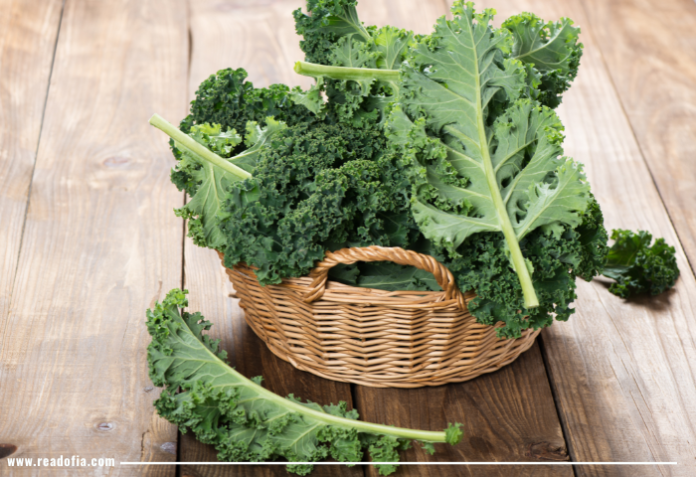Kale is a leafy dark green vegetable, belongs to the family Brassicaceae. Belongs to the same family of cabbage and Brussels sprouts, Kale is considered the most nutritious plant food that exists. Kale is labeled as a superfood because it contains numerous health beneficiary vitamins, minerals, antioxidants, and plant compounds.
Kale Nutrition Facts
According to the USDA data, the nutritional value of boiled kale (100 g) without salt are as follows.
| Nutrient | Value |
| Calories | 28 |
| Carbohydrates | 5.63 g |
| Sugars | 1.25 g |
| Fiber | 2 g |
| Fat | 0.4 g |
| Protein | 1.9 g |
| Water | 91.2 g |
Vitamins in Kale
According to the USDA data, vitamins and their quantity in 100g of boiled kale without salt are as follows.
| Vitamins | Quantity |
| Vitamin A equiv. | 146 µg |
| lutein + zeaxanthin | 4983 µg |
| Thiamine (B1) | 0.053 mg |
| Riboflavin (B2) | 0.07 mg |
| Niacin (B3) | 0.5 mg |
| Pantothenic acid (B5) | 0.05 mg |
| Vitamin B6 | 0.138 mg |
| Folate (B9) | 13 µg |
| Choline | 0.4 mg |
| Vitamin C | 41 mg |
| Vitamin E | 0.85 mg |
| Vitamin K | 418 µg |
Minerals in Kale
According to the USDA data, minerals and their quantity in 100g of boiled kale without salt are as follows.
| Minerals | Quantity |
| Calcium | 72 mg |
| Iron | 0.9 mg |
| Magnesium | 18 mg |
| Manganese | 0.416 mg |
| Phosphorus | 28 mg |
| Potassium | 228 mg |
| Selenium | 0.9 µg |
| Sodium | 23 mg |
| Zinc | 0.24 mg |
Health Benefits of Kale
- Protection against diabetes
- Lowers the risk of heart disease
- Limit the risk of cancer
- Improves eye and bone health
- Healthy digestive system
- Skin and hair care
FAQ
What benefits do calcium and potassium in Kale provide?
Kale is a good source of potassium, which boosts heart health. And its high calcium content promotes bone health.
Is Kale is good for eye health?
Yes. Kale is rich in an antioxidant called beta-carotene, which our body converts into vitamin A. This vitamin plays a vital role in eye health.

